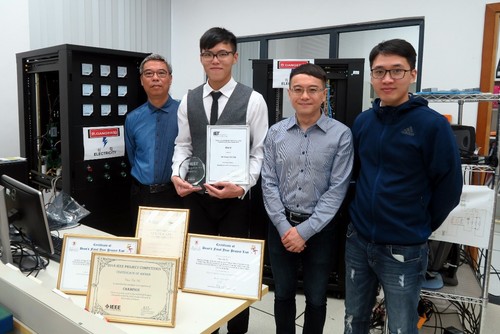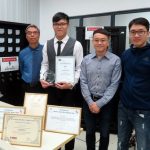 (From left) Wong Chi Kong, Chao Chi Wa, Lam Chi Seng, and Choi Wai Hei.
(From left) Wong Chi Kong, Chao Chi Wa, Lam Chi Seng, and Choi Wai Hei.
Chao Chi Wa, a fourth-year student from the Department of Electrical and Computer Engineering, Faculty of Science and Technology (FST), University of Macau (UM), received an Outstanding Electrical Power and Energy Engineering Student Award 2018 from the Institution of Engineering and Technology, Hong Kong, for his outstanding academic research and final-year project design for a photovoltaic (PV) inverter system that not only can generate PV power but also can compensate for power quality problems. Chao observed that the non-linear electrical loading systems, such as escalators, large centralised air-conditioning systems, and energy-saving lights, can cause serious power quality problems in the power grid, which can lead to the malfunction of electrical equipment and increased loss of energy. To address this problem, he proposed a PV inverter system that can generate a steady amount of PV power while compensating for power quality problems, thus reducing distribution power loss and reducing emissions. The PV inverter system can be used in commercial buildings, hotels, and casinos, etc.
Photovoltaics energy is considered to be one of the most promising renewable sources of energy. In his study, titled ‘Analysis, Design, and Implementation of Voltage Mode Controllers for a Multi-Functional Capacitive and Hybrid-Coupling Grid-Connected Inverters for Photovoltaic Energy Generation and Power Quality Conditioning’, Chao analysed the characteristics of capacitive- and hybrid-coupling grid-connected inverters and proposed a PV power generation system that provides more functions than traditional models. Besides generating electricity with solar power, the PV inverter system can also improve power quality in the grid, thereby conserving energy and reducing emissions. Moreover, the voltage mode controllers proposed by Chao can significantly enhance the efficiency and performance of the new PV inverter systems. Sponsored by the Science and Technology Development Fund of the Macao SAR (ref No: FDCT 025/2017/A1) and the UM Research Committee, Chao’s project was jointly supervised by Dr Lam Chi Seng from the State Key Laboratory of Analog and Mixed-Signal VLSI, Dr Wong Chi Kong from the FST’s Department of Electrical and Computer Engineering, and Assistant Officer for Laboratory and Administrative Affairs Mr Choi Wai Hei.
Chao’s project has won the championship at the IEEE Project Competition 2018, which was organised by the IEEE UM Student Branch; the Best Final Year Project Award from UM’s Department of Electrical and Computer Engineering; and the 2018 IEEE Macau Power and Energy Power Electronics Joint Chapter Award. Also, it has been included in the FST Dean’s Final Year Project List 2017/2018. In addition, a paper based on this research project has been accepted for presentation at the 44th annual conference of the IEEE Industrial Electronics Society (IECON 2018) to be held in October in Washington DC, United States. Chao Chi Wa thanks his teachers at UM for their guidance. ‘They are very good at explaining complex concepts in a simple and effective way. They also teach students how to put their knowledge into practice,’ he says. ‘UM’s laboratories have very good equipment and facilities and provide a very good environment for students to do research. Compared to universities in Macao and its neighbouring regions, I think UM provides the best learning environment, and that’s why I chose this university.’ Chao completed his secondary education at Matteo Ricci College in Macao. He is currently an undergraduate student at UM, and plans to pursue a master’s degree at UM after graduation.


